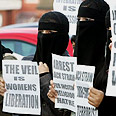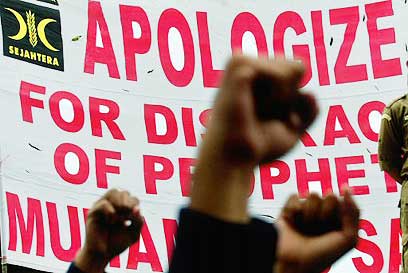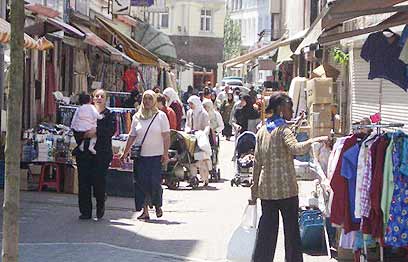
EU’s fight against radical Islam
Religious leaders, politician say only if Muslim immigrants accept western values tensions would subside
(DUSSELDORF) – Henrik Broder, a prominent Jewish journalist in Germany, recently published a book titled, “Hooray! We Surrender!” which criticizes what the author refers to as ‘Europe’s weakness in its battle against Islam.’
“We must define what sets us aside as a society, and what values we must uphold in our struggle against Islam,” Broder tells Ynet.
Broder’s remarks come amid the ever-increasing tension in Europe between the traditional values and those of radical Islam, which are beginning to spread throughout the continent. It began with the Madrid terror attack, which was carried out by a cell of immigrants from North Africa and the Middle East and continued with the London bombings, which were carried out by UK-born Muslims, and the attempts to attack airliners in Britain and trains in Germany. In the interim there were the violent riots in response to the prophet Muhammad caricatures, the outrage and threats over Pope Benedict XVI’s accusations and the public outcry following the UK veils affair.

Muslim Europeans protesting Muhammad cartoons (Photo: AFP)
With the end of the Cold War 17 years ago, Europe was able to unite around values of democracy, individualism and a free market. But lately the atmosphere ion Europe has begun to change, and tolerant Europe has started to organize against radical Islam (and some say Islam in general), an ideology that is being referred to more and more as ‘an enemy of modern western society’s lifestyle.
Until recently political correctness reigned in Europe, and those who dared point an accusatory finger at minorities were ostracized. When immigrants attacked their host-countries in Europe, the Europeans blamed western society for ‘inadequately absorbing them.’
Dialogue, not confrontation was the solution to the absorption difficulties of immigrants; criticism of the Muslim minority, part of which refused to accept the social ideals of the majority, was dismissed as racist - and so the Muslims in Europe did not integrate with the western population.

Muslim quarter in Brussels (Photo: Roee Nahmias)
But following Madrid and London attacks, as well as the Muslim riots over the Mohammad caricatures, there are more and more signs indicating that the European Union is beginning to view Islam and the Muslim immigrants as an existential threat.
Mission: Intelligence
About 15 million Muslims live In Europe today, which constitute about 3-4 percent of the population in most European countries. In France, Muslims make up and estimated 10 percent. Police forces across Europe have already started to focus efforts on collecting intelligence information among their countries’ Islamic communities.
For German intelligence, for instance, this is virgin territory. German police, who confer regularly with Jewish officials to assess the threat to their safety, admitted to them that they have know idea of the goings-on in Germany’s Muslim communities.
Senior police officials themselves confessed to Ynet that, “There are whole areas in German cities that in our view are ‘out of bounds’, and we don’t enter them anymore. For too long we thought that as long as we let them manage themselves, they won’t bother us. Now this attitude is taking its revenge on us.”
Germany Defense Ministry official Christian Schmidt, a member of the governing Christian Democrats party (CDU), told Ynet that among the Muslim community in his country, “Thousands tend towards extremism and pose a threat to us.”
He said that contrary to absorption processes in other communities, among Muslims future generations become more fanatic, with “the third generation being the most extremist.”
Currently various German states are considering legislation to obligate imams to carry sermons in German, to “increase the transparency of Muslim communities and abate concern and suspicion.” In effect, this reflects the shortage of Turkish and Arabic speakers in the German intelligence community and the difficulties hindering them from collecting crucial information from this sector.
Tensions between communities have been rising since last summer's thwarted terror attacks in Britain and Germany. Two and a half month ago plans to blow up two trains in Koln failed to materialize due to technical failures in the makeshift bombs hidden in two suitcases.
German authorities nabbed a number of suspects and the mastermind of the attempted attacks, which prompted a debate about whether the government should make it obligatory for transportation operators to install CCTV cameras on trains.
In Britain a plot to blow up a number of US-bound planes using liquid explosives, shook a nation that was still trying to come to terms with the July 7 attacks two years earlier.
Relations between 1.8 British Muslims and the rest of the country suffered another set back as tension grew and a wide-scale arrest raids conducted against Muslim terror suspects across the country only added fuel to the fire.
The government said it is weighing plans to cut public funds to Muslim schools, although no such plans were considered for the 36 Jewish and 7,000 Christian schools in the monarchy.
In another dramatic development, the Ministry of Education announced new regulation to the higher education system which would make it obligatory for British universities to keep track of the activities of Muslim students and report any suspicious behavior to law enforcement authorities.
Many countries did not suffice with discussions: The governments of Germany and Britain launched dialogue with Muslim organizations in the hope that a European form of Islam – one that is pragmatic and pacifist - would emerge.
In Berlin, the home of many Germans of Turkish origins, Turkish kindergartens would be forced to adopt the German language as the only communication tool in the hope to inoculate minority children with the values of democracy and civil rights.
In Switzerland meanwhile, where Muslims constitute less than one percent of the population, referendums held in a number of cantons reflected the will of an overwhelming majority to limit the spread of Islam. More so, strict immigration laws were introduced, and in many areas the construction of new Mosques has been banned.
Debate on values
But for many this is not enough. While individualism has been a supreme value in Europe for many decades, common European values have been subject to intense debate especially to the backdrop of Turkey's impending membership in the European Union.
"We need to start public discussions about our values, which we have to communicate in a resolute manner," Michael Geller, a member of the European parliament representing Germany's CDU told Ynet.
"Islam is not a threat yet, but a challenge that forces us to define our common values. Citizen rights and the status of women especially are things that should be assimilated among Muslim immigrants," he said.
Henrik Broder however is a skeptic. "I don't think Europe know to do something besides to surrender. People have no idea what they are fighting for. We can't set the clock back, and I don't want Europe to give up on its Muslims. But when the Dutch justice minister says it is possible for Sharia to become the basis for Dutch laws and when in England there are independent Sharia courts – that's the end of European societu as we know it," he said.










